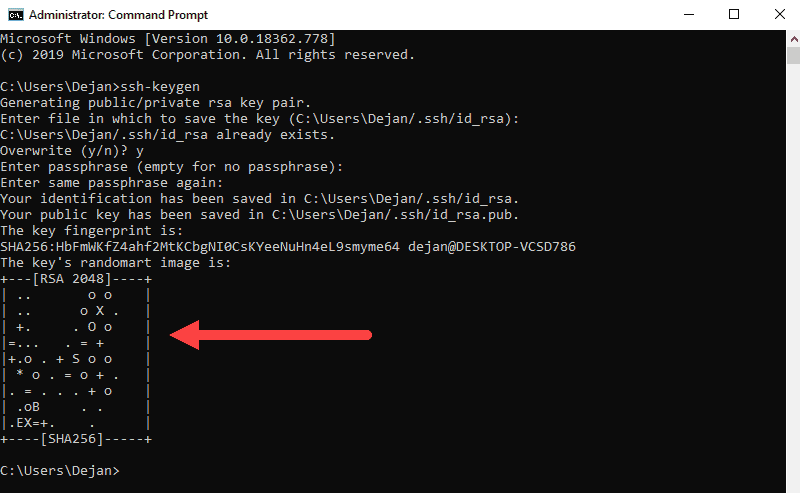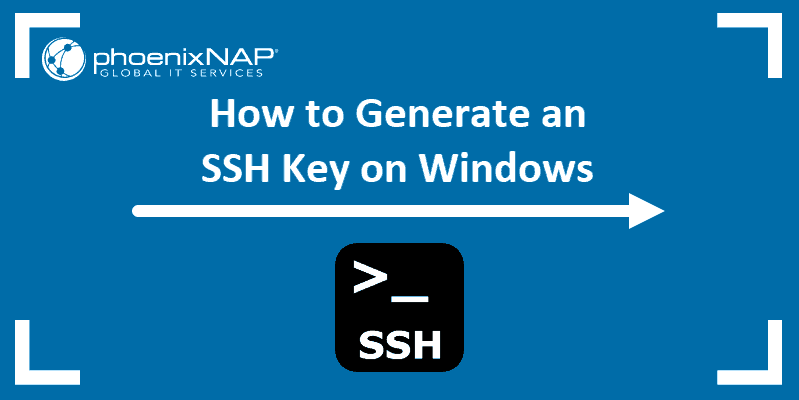Antwort How do you generate a SSH key? Weitere Antworten – How do I generate a SSH key

For Windows 10 & 11
- Press the Windows key or open up the Start Menu. Type “cmd”.
- Under “Best Match”, click “Command Prompt”.
- In the command prompt, use the ssh-keygen command:
- The system will now generate the key pair and display the key fingerprint and a randomart image.
- Open your file explorer.
To generate an SSH key on your Linux server, run the command ssh-keygen . The command can take flags if you would like to customize the type of key that is generated and the signing algorithms that are used to generate the key. This example generates a standard 2048-bit RSA key without a passphrase.Copy the ssh key into remote servers
- Open a terminal on your local computer.
- Generate an SSH key pair if you haven't already done so by running the command: ssh-keygen .
- Once the key pair is generated, run the command: ssh-copy-id user@remote_server .
- You'll be prompted to enter the password for the remote user account.

How do I find my SSH key : Checking for existing SSH keys
- Open Terminal .
- Enter ls -al ~/.ssh to see if existing SSH keys are present. $ ls -al ~/.ssh # Lists the files in your .ssh directory, if they exist.
- Check the directory listing to see if you already have a public SSH key.
- Either generate a new SSH key or upload an existing key.
How to generate SSH public key in Linux
Procedure
- In a terminal, run the ssh-keygen command.
- Generate the public/private RSA key pair.
- Specify the directory in which to save the key pair. For example, /Users/mymac/. ssh/id_rsa… mysftpkey.
- Enter the passphrase. Then, enter the same passphrase again. Enter empty if you don't want to use a passphrase.
What is an example of a SSH key : For example, ssh -i /home/ylo/secure/my-key [email protected] would use a private key from the file my-key for authentication. The default identity key location can also be configured in /etc/ssh/ssh_config or the user's . ssh/config file using the IdentityFile option.
Yes, if you change the machine from which you access your servers, you can just copy the ~/. ssh directory from the old machine to the new one. It is unnecessary (and cumbersome) to generate a new key pair for every server. You just need the private keys on your new machine.

Functionally SSH keys resemble passwords. They grant access and control who can access what. In identity and access management, they need similar policies, provisioning, and termination as user accounts and passwords.
How do I find and copy a SSH key
Copying Public Keys to Remote Servers
You can run ssh-copy-id or manually configure the file. For systems with password authentication enabled, you can copy the public key from the client system to the remote server using the ssh-copy-id command. The tool also sets the permissions of $HOME/. ssh and $HOME/.Generating an SSH Key Pair on UNIX and UNIX-Like Platforms Using the ssh-keygen Utility
- Navigate to your home directory:
- Run the ssh-keygen utility, providing as filename your choice of file name for the private key:
- Enter a passphrase for the private key, or press Enter to create a private key without a passphrase:
We strongly recommend using only the ed25519 algorithm (an ECDSA variant). It is the most secure SSH key type widely available, and is very well supported in the majority of systems. If you are using an client or server without ed25519 support, you should consider upgrading where possible.

SSH supports two main methods of authentication: passwords and keys. Passwords are easy to use and remember, but they are also vulnerable to brute-force attacks, phishing, and human errors. Keys are more secure and efficient, but they require more setup and management.
How do I export my SSH key : To export your private SSH key:
- Select the OpenSSH keys keyring from the left side panel.
- Select the Personal SSH key, that has to be exported, from the list.
- Right click on the selected key and select Properties ▸ Details.
- Press the Export Private Key button to save the exported private key on your computer.
How to copy SSH key from Windows : You can copy your public key using the OpenSSH scp secure file-transfer utility, or using a PowerShell to write the key to the file. The ACL on this file needs to be configured to only allow access to administrators and System.
Is SSH key a private key
An SSH key relies upon the use of two related but asymmetric keys, a public key and a private key, that together create a key pair that is used as the secure access credential. The private key is secret, known only to the user, and should be encrypted and stored safely.

How to view your SSH public key on Linux
- Using the ssh-agent command.
- Run the following command. ssh-agent sh -c 'ssh-add; ssh-add -L'
- After successful authentication, your SSH public key will be displayed in the terminal.
- Copy and paste it where you need it.
Generate an SSH Key Pair
- Run the ssh-keygen command. You can use the -t option to specify the type of key to create.
- The command prompts you to enter the path to the file in which you want to save the key.
- The command prompts you to enter a passphrase.
- When prompted, enter the passphrase again to confirm it.
Who should generate SSH key : While private keys should be kept secret by the authorized person wishing to gain access to a system, public keys may be freely shared. SSH keys are usually generated by a user entering a passphrase or other information.



